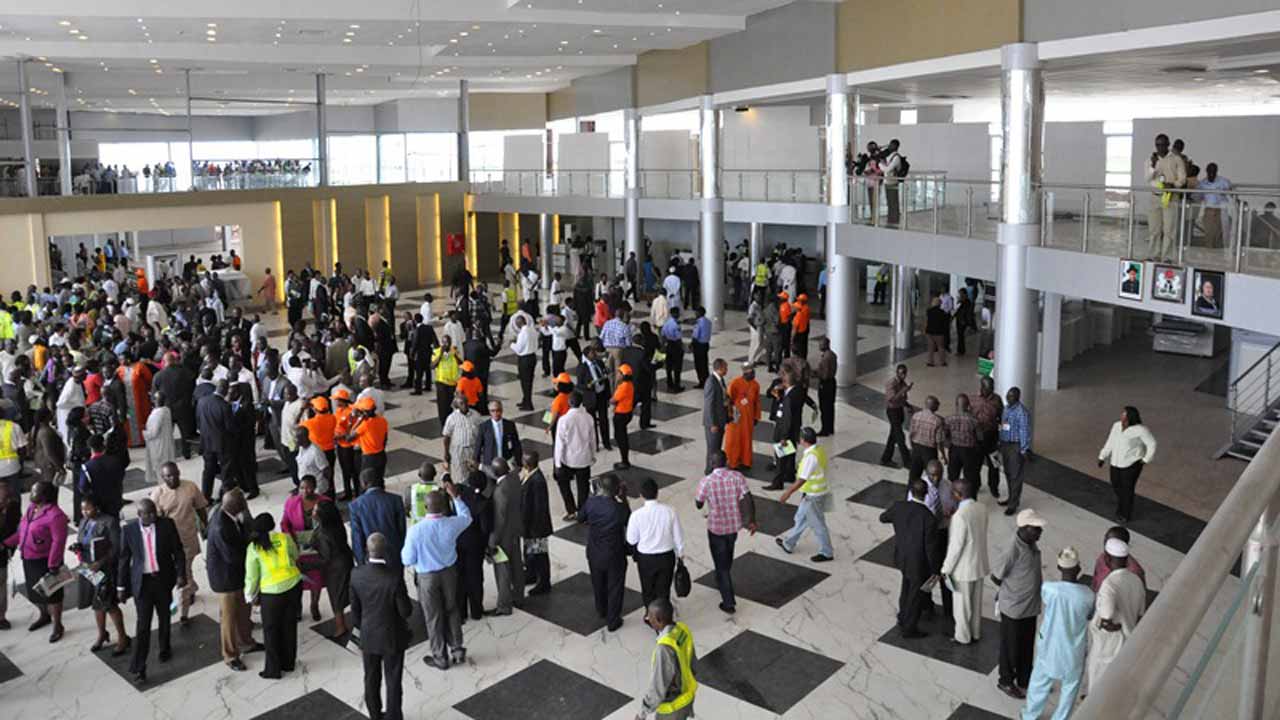- Aviation Unions Ground Activities at MMA2
The Air Transport Services Senior Staff Association of Nigeria, the National Union of Air Transport Employees and the National Association of Aircraft Pilots and Engineers on Wednesday left hundreds of passengers stranded as they picketed the Murtala Muhammed Airport Terminal Two.
The unions’ officials, who were said to have arrived at the terminal as early as 6am, barricaded the entrance with their vehicles, preventing passengers, business owners, airlines’ workers and other airport users from gaining access into the terminal.
The picketing, which lasted till early evening, the leaders of the unions said was due to the disengagement of some workers ofby Bi-Courtney Aviation Services Limited, operators of the MMA2.
Hundreds of passengers missed their flights out of Lagos as the terminal accommodates over five airlines that operate their daily flights from there.
Although no figure has been quoted, the airlines are expected to lose millions of naira due to their inability to operate normally.
The Media and Communications Manager, Dana Air, Kingsley Ezenwa, told our correspondent that over 100 passengers missed their early morning flights, while one of the airline’s employees was injured during a disagreement with the protesting members of the unions.
“We will later calculate our losses because the protesters were here all day. We operated few flights today, only those from outside Lagos were allowed to come in,” he said.
The unions had in a circular dated October 5, 2018, threatened to shut down operations at the terminal on October 10 over the sacking of 20 employees, who indicated interest to join the unions.
They said the notice was issued following the refusal of the BASL management to cooperate with the interventions of the Nigerian Civil Aviation Authority and other airport security agencies over the issue.
The notice read in part, “By this notice, all aviation workers connected with the MMA2, including the employees of BASL, are hereby directed to withdraw their services as above notified and join other members in the organised protest activities at the terminal on that date as from 6am.
“By this notice also, all business enterprises, including airlines, are hereby advised to note this development and make alternative arrangements as may be feasible. In a similar manner, the travelling publics are equally advised to seek alternative travelling points, or dates.”
The management of BASL, however, obtained a restraining order from a Federal High Court sitting in Lagos on Tuesday stopping the unions from the planned disruption of activities.
The BASL also issued a statement saying, “We will like to bring it to the attention of the entire public that the Federal High Court in Lagos, in suit number FHC/L/CS/16412/18, has granted an order restraining the unions from carrying out their threats of disrupting the activities of the terminal.
“Pursuit to this order, members of the unions found in the premises of MMA2 would be liable to trespass. We reserve our right under the law of Nigeria to deal with such persons as trespassers.”
The BASL also assured customers and passengers of the MMA2 that they would continue to have seamless access to the facility, adding that it was fully aware of the plan by the unions to disrupt the operations of the terminal and that it reserved the right to ensure that its operations and services were not interrupted in any way whatsoever.
The General Secretary, NAAPE, Aba Ocheme, however, told our correspondent that the unions were not served any court order.
“The court order exists only in the media because none of the three unions was served,” he stated.
According to him, the unions took a break at sunset on Wednesday and would continue today (Thursday) until their demands are met.
He stated that the leadership of the unions met with the Airport Police Command and had agreed that other airport users would not be affected.
“We have agreed to abide by the normal security procedures so that road users will not be disturbed as we continue with the strike on Thursday,” he added.


 Naira4 weeks ago
Naira4 weeks ago
 Naira4 weeks ago
Naira4 weeks ago


 Naira4 weeks ago
Naira4 weeks ago




 Naira3 weeks ago
Naira3 weeks ago
 Commodities4 weeks ago
Commodities4 weeks ago


 News4 weeks ago
News4 weeks ago


 Banking Sector4 weeks ago
Banking Sector4 weeks ago
 Travel4 weeks ago
Travel4 weeks ago























